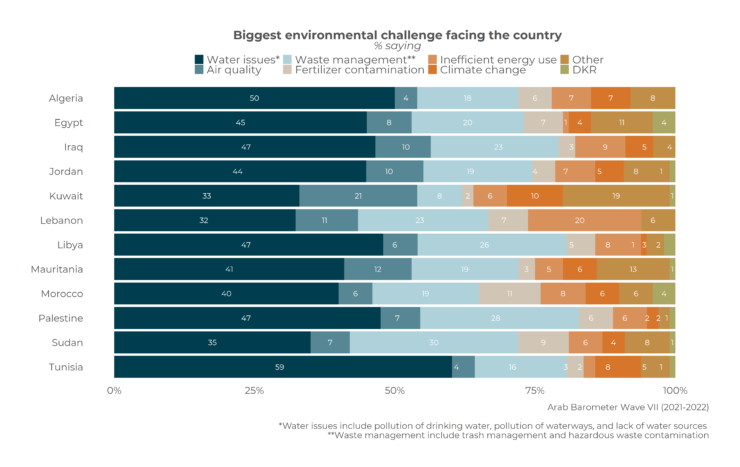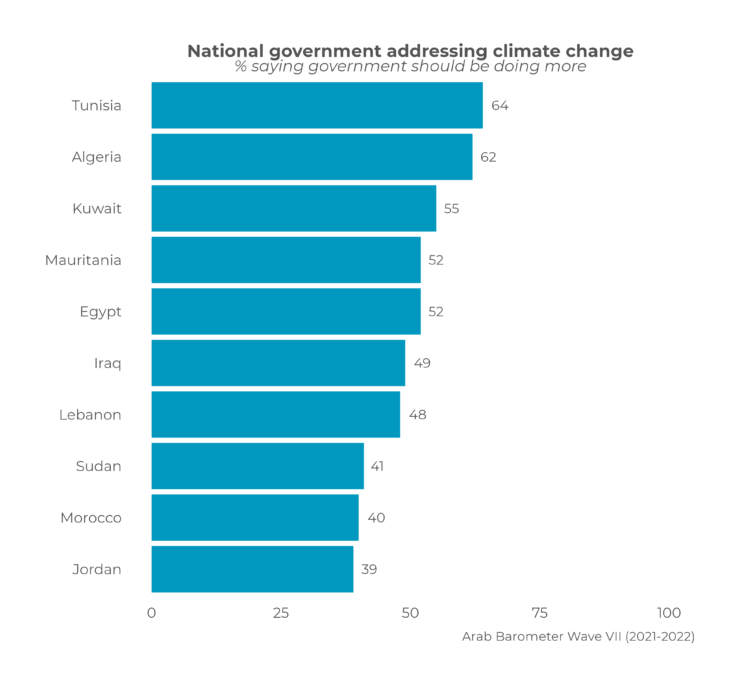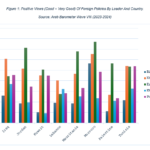Overshadowed by the war in Gaza, the 2023 UN Climate Change Conference (COP28) concluded its final session on December 12, 2023 in Dubai to mixed responses. On the one hand, COP28 reached some important achievements, including a deal calling for transitioning away from fossil fuels and a loss and damage fund. On the other hand, some argue that such celebrated achievements fell short of what is actually needed.
While the steps taken at COP28 may prove important in the fight against climate change, ordinary citizens living in the Middle East and North Africa (MENA) likely do not perceive that they are tackling the environmental issues they see as most important. In its Seventh Wave of surveys (2021-2022), Arab Barometer asked the people in 12 countries across the region about their views regarding the environment and climate change. Only a small minority names climate change as the most important environmental challenge facing their country. By contrast, water-related issues, including lack of water resources or pollution, top the list of environmental challenges faced by MENA countries. At least a third of the population in all countries surveyed say that water-related issues are their country’s most pressing environmental challenge. While water shortages may be linked with climate change, organizers may have missed an opportunity to raise awareness for those living in the region by not proposing clearer solutions to the day-to-day challenges faced by citizens.

There is widespread agreement across the region that lack of citizen awareness contributes to the existing environmental challenges. But the burden is not on citizens alone. Similar levels of agreement exist on government responsibility. The majority of people in all countries surveyed say that lack of governmental initiatives and spending contributes to environmental issues. It is, therefore, no surprise that pluralities, at least, in all countries surveyed say that their governments should be doing more to address climate change.

While citizens want more government action in addressing climate change, other immediate issues take precedence. When asked about their government spending priorities in the upcoming year, only small minorities in each country surveyed point to the environment. Education, healthcare, and economic development are higher than the environment on the short-term priorities list.
The COP28 summit set up the Loss and Damage Fund that was agreed on during the COP27 summit in Egypt last year. The fund is supposed to be a mechanism for poorer countries coping with the consequences of climate change to hold wealthy, polluting countries responsible for the destruction they have caused to the environment. This destruction has been estimated to be more than $400 billion per year in the developing world with the bill expected to grow even more in the coming years based on the current trajectory.
Only a small percentage (less than 2 percent) of needed funds has been raised so far, however. Also, details on the pledged funds are yet to be disclosed, furthering criticism of developed countries’ commitment and the summit’s actual achievements. In any case, if the Loss and Damage Fund succeeds in raising the required amount, it could provide governments in the region with the necessary resources to allocate more money for climate action programs.
Without such resources, it is very likely that governments across MENA would remain focused on the most imminent challenges to the livelihoods of their people, lacking in the process any funds to spare for addressing climate change.
While the COP28 summit made important progress, as outlined in the Global Stocktake, what has been accomplished so far still lags behind the concerns and demands of people across the region. To ensure citizens are not left behind, it is essential for future conference organizers and environmental activists to clearly demonstrate the link between climate change more broadly and the day-to-day environmental issues being faced by those in the region.



